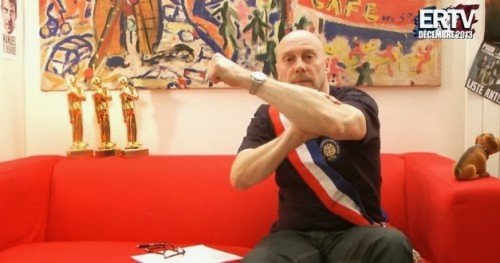Alain Soral FAQ, Part 2
Where is Alain Soral coming from? Or, from “Game” to Social Conservatism

A young Alain Soral discusses “game” on television
Born on October 2, 1958, Alain Soral had by all accounts a miserable family life, beaten by his father, a downwardly-mobile déclassé who was convicted of fraud and lost his properties. He went to Paris in 1976 doing odd jobs. Despite having no high school diploma, he found work in the cultural-media-advertising world through his sister Agnès Soral, who as an aspiring actress had a growing network in the mondain world of Paris show business and commercial culture (e.g. marketing).
Alain apparently hated this work as unfulfilling and morally bankrupt, finding it terribly boring. He seems to have been motivated by a sharp sense of humiliation as a bourgeois-turned-proletarian (saying he had a “double consciousness” as both proletarian and bourgeois as a result), a sharp intellect, an acute sensitivity to the nuances of social life around him, and a hunger to prove himself and be loved. Those who have followed the careers of Roissy/Heartiste and RooshV may find it interesting that the young Soral was a dragueur de rue (a street pick-up artist), apparently coming to bed over 800 women, especially enjoying young, narcissistic bourgeois women as a form of “class struggle.”
Jonathan Bowden, who stressed the link between art and radical, dissident politics, might not be surprised to learn that Soral’s first interest was in the arts, going on to study at the Paris Beaux-Arts. He read a large amount of political literature, mainly Marxist, including Michel Clouscard, Lucien Goldmann, György Lukács and others. He would later write in the third person: “Alain Soral, former dragueur de rue who loved books as much as girls, so much so that he has not chosen between them.” Here is clearly a “cultured thug”…
Depressed and reportedly contemplating suicide, he co-authored a book on fashion (Les Mouvements de mode expliqués aux parents, 1984), apparently as a challenge to himself, which became a surprise best-seller. It soon became Soral’s ambition to liberate himself from wage slavery by living modestly from books. Over the next decades he would publish the following works:
- La création de mode: Comment comprendre, maîtriser et créer la mode(1987)
- Le Jour et la Nuit, ou la vie d’un vaurien(1991): An autobiographical novel he wrote while being a castle caretaker; did not sell well.
- Sociologie du dragueur(1996): His guide to “game,” really a kind of autobiographical essay with powerful meditations on epistemology (theory vs. practice, intellectual vs. practitioner), male-female roles, and human existence.
- Vers la feminization ? : Démontage d’un complot antidémocratique(1999): An attack on official and narcissistic bourgeois feminism.
- Jusqu’où va-t-on descendre ? Abécédaire de la bêtise ambiante(2002): Politically incorrect analyses of various aspects of contemporary politics and society.
- Socrate à Saint-Tropez: texticules(2003): The same as above, with legally risqué critiques of communautarisme(e.g., the rise of lobbying by gay/feminist/Jewish elites), the subtitle being a pun on “small-texts” and “testicles”.
- Misères du désir(2004): A novel.
- CHUTe ! Éloge de la disgrâce(2006): A novel on the decline and fall of an “honest journalist” (or on the inevitability of official journalism as propaganda).
Soral has also directed a film, Confession d’un dragueur, based on his books on seduction.
I will not attempt to psychoanalyze Soral to try to determine what has made him choose the remarkable and difficult path he has taken. But it is important to know the man’s biography given the nature of Soralian epistemology. Read more







